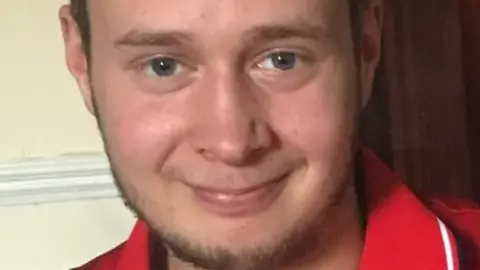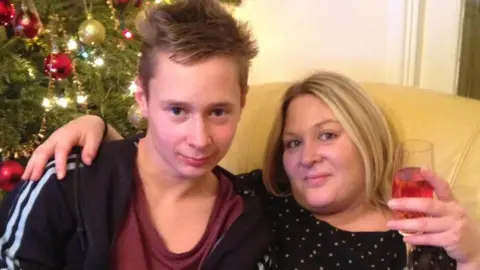Haydon Croucher: Missing teen's brother's death was 'avoidable'
 Family photo
Family photoThe death of a missing woman's brother who took his own life after being discharged from mental health services was "avoidable" his family have said.
Haydon Croucher, 24, from Milton Keynes, died in November 2019, nine months after sister Leah was last seen.
Milton Keynes Coroner's Court heard he was assessed for hospital admission, but no beds were available locally.
Relatives said there would have been a different outcome if he had been admitted.
The hospital's trust said it wholly accepted "the need to learn from this tragic incident".
Mr Croucher's inquest on Tuesday heard from therapist Chantelle Tillison, who said he "explained Leah was still missing and found it difficult to cope".
She said she persuaded him to go with her to Milton Keynes Hospital for an assessment, but he did not want an out-of-area psychiatric bed.
Milton Keynes Senior Coroner Tom Osborne said he was "not satisfied an inpatient bed was discussed" for Mr Croucher.
Recording a conclusion of suicide, Mr Osborne also found Haydon's discharge was "not adequately risk assessed" and the lack of a plan around it had "contributed to Haydon's death".
 Thames Valley Police
Thames Valley PoliceIn a statement released through Oakwood Solicitors, the family said at the inquest they "heard of intentions to renovate the inpatient ward facilities, which would see a reduction in availability of beds".
"This is a concern given that at the time of Haydon's crisis no local bed was available - in addition the provision of an out-of-area bed was not explored with Haydon and he was simply sent home with no adequate provision for support.
"The family considers the trust still have a lot to learn from the avoidable death of Haydon and others before him."
 Family photo
Family photoDr Stephanie Oldroyd, clinical director of mental health services at Central and North West London NHS Foundation Trust Milton Keynes said: "This family has lost a great deal and we are deeply sorry for the pain they are experiencing.
"We wholly accept the conclusion of the inquest and the need to learn from this tragic incident. At the inquest I described the changes we have been making to provide better clinical oversight of cases, and improve the way we manage risk and plan for discharge."
Dr Oldroyd said a new 24-hour crisis resolution and home treatment team "will provide more robust care and support for people when they most need it" and the inpatient renovation would "improve privacy and dignity for people in hospital, by moving from dormitories to single rooms".
- For information and support on mental health and suicide, access the BBC Action Line.

Find BBC News: East of England on Facebook, Instagram and Twitter. If you have a story suggestion email [email protected]
